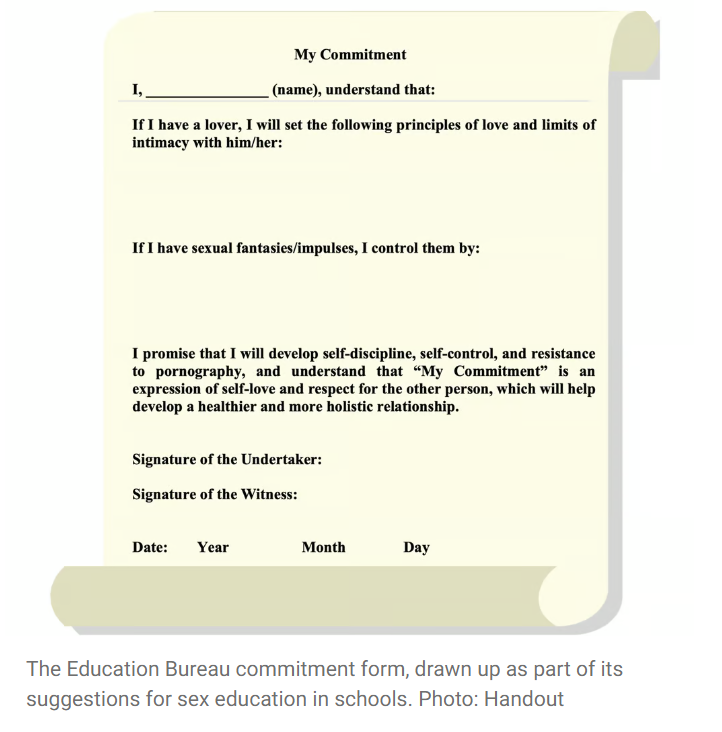The Badminton Solution: Can Sports Really Deflect Sexual Temptation?
DISCUSSING ALOUD
8/27/20244 min read




Imagine a scenario: a teenage couple is sitting close together, the warmth of the moment heightening their awareness of each other's presence. The boy feels a surge of attraction, his mind clouded with temptation. According to recent guidance from Hong Kong's Education Bureau, the solution is simple: grab a badminton racket and head to the nearest court. But can a game of badminton—or any physical activity—serve as an antidote to the natural pull of sexual desire? Let’s delve into this intriguing question.
The Science Behind Distraction
At first glance, the idea of using physical activity to distract from sexual urges might seem absurd, even laughable. After all, how can hitting a shuttlecock back and forth possibly compete with the intensity of sexual attraction? However, there’s a kernel of logic behind this advice, rooted in the concept of cognitive redirection.
Sexual arousal is a complex interplay of hormones, emotions, and thoughts. When we engage in a physical activity like badminton, our brain shifts focus. Physical exercise requires concentration, coordination, and energy—resources that the brain can’t easily allocate to sexual fantasies at the same time. The competitive nature of sports adds an extra layer of engagement, pulling the mind further away from thoughts of intimacy.
Exercise also triggers the release of endorphins—natural mood elevators that can counteract the dopamine rush associated with sexual attraction. In this way, playing badminton could, theoretically, shift the emotional and physiological state of the individual, reducing the intensity of sexual urges in the moment.
The Limits of Physical Distraction
However, while playing badminton might provide temporary relief from sexual tension, it’s important to acknowledge the limits of such an approach. Sexual impulses are not just fleeting thoughts that can be swatted away like a shuttlecock; they are deeply ingrained drives that resurface, often with more intensity, when not properly addressed. The danger lies in relying too heavily on distraction without developing a deeper understanding of these impulses.
For adolescents, whose hormones are surging and who are just beginning to explore their identities and desires, sports and physical activities should be part of a broader toolkit for managing sexual urges. Engaging in sports can certainly help by providing an outlet for energy and reducing stress, but it should not be seen as a panacea. A more holistic approach is needed—one that includes education about sexual health, emotional intelligence, and self-regulation techniques.
A Broader Approach: Beyond the Court
Let’s imagine a more comprehensive scenario. Instead of advising teens to simply play badminton, educators could encourage them to explore a variety of activities that promote self-discipline, mindfulness, and emotional regulation. For instance, meditation and mindfulness practices can teach young people to observe their thoughts and feelings without being overwhelmed by them. This builds a foundation of self-awareness and emotional control that can be more effective in the long run.
Creative pursuits like art, music, or writing can also serve as powerful outlets for emotions and desires. By channeling their energy into creating something meaningful, adolescents can find fulfillment and satisfaction that reduces the power of fleeting temptations.
Moreover, physical activity itself can be broadened beyond the court. Martial arts, for example, combine physical exertion with mental discipline, teaching control over both body and mind. Yoga, which focuses on breath control and mental clarity, can help young people develop a deeper connection with their bodies and learn to manage impulses more effectively.
Who We Are:
The Economic Nations champions global unity through economic collaboration, focusing on sustainable growth, reducing inequalities, and enhancing global relationships for mutual prosperity and peace.
______________________________________
PIC: Canva
The Power of Social Connection
Another critical aspect that cannot be overlooked is the role of social connections. Playing badminton—or any sport—can be a powerful tool for building social bonds. When young people engage in group activities, they learn teamwork, communication, and mutual respect. These social skills are essential for developing healthy relationships, including romantic ones.
When sexual urges are seen within the context of a larger social framework, where mutual respect and understanding are prioritized, the temptation to act on these impulses inappropriately may diminish. In this sense, sports and group activities can indeed contribute to a healthier approach to sexuality—not just by providing distraction, but by fostering an environment where young people feel valued and supported in ways that go beyond physical attraction.
The Creative Mind: An Unexpected Ally
Finally, let’s not underestimate the power of the creative mind in managing sexual temptation. Adolescents are at a stage where their imaginations are incredibly active. Encouraging them to channel their creative energy into projects—be it writing, drawing, building, or inventing—can be an effective way to redirect the intense emotions that often accompany sexual development.
In this way, the concept of “distraction” takes on a richer meaning. It’s not just about diverting attention from sexual thoughts; it’s about engaging the mind and body in activities that are fulfilling and meaningful, thus reducing the psychological need to seek gratification through sexual means alone.
Conclusion: Beyond Badminton
While the suggestion to play badminton as a way to fight sexual temptation might seem overly simplistic, it opens up a broader conversation about how we manage our natural impulses. Physical activity can be an effective tool at the moment, but it must be part of a larger strategy that includes education, emotional development, and creative expression.
Sexual impulses are natural and powerful, but they don’t have to dictate behavior. By encouraging young people to engage in a wide range of activities that foster self-discipline, creativity, and social connection, we can help them navigate their sexual development with confidence and integrity. Ultimately, it’s not just about avoiding temptation—it’s about building a life that is rich, fulfilling, and aligned with one’s deepest values. And sometimes, a game of badminton can be a small but useful part of that journey.
Contacts
enquiry@economicnations.org
(xx) 98-11-937-xxx (On verification)
